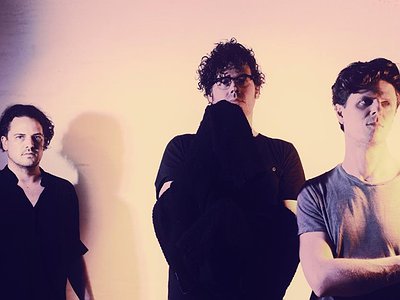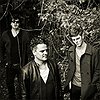Could you describe your creative process on the basis of a piece or album that's particularly dear to you, please? Where do ideas come from, what do you start with and how do you go about shaping these ideas?
I think I've always tried numerous ways to skin a cat. Even within our recent record New Spirit there were several processes going on in the writing stage. And again it was very different to every record we've done before. For example our record Church With No Magic was all based upon initial improv sessions that we would edit, replay, overdub, rewrite and try things out. We wanted it to sound more live than the previous recording, so what better way than to record jams. But this last one, there was a lot of midi and computer interaction: sending files to each other but also playing along to midi ideas in studio. But then there were whole tracks I initially wrote with only vocal and a guitar–to really find the essence of the song and the lyric–which then turned electronic. It's hard to explain all this in one paragraph; it changes all the time for me. I've got about 3 or 4 unfinished records that went on while I was writing this last one and all of them were somehow part of the process.
Maybe I should use a specific example. Our track ‘Another Life’ starts as two loops (basically) that Laurence (my brother/drummer) came up with. The main keyboard chords that rise up, over a 6/4 bar, and the midi timpani sounds make that weird percussive/melodic hook. So we had a great hook but not really much of a song. So we worked on beats – Laurence playing a very sparse live drum beat along, and me programming the very digital sounding drums together. Then I essentially tried some vocal melodies on top, while playing only a Korg Ms20 bassline to find the harmony. I had heard an old French song – from a musical or something – called Autre Vie. I just liked the phrase 'I dreamed of another life', so I kind of ripped that off into English and created my own lyrical world around it. At the time I was thinking a lot about Australia, and how I myself yearned for a cultural life that seemed to be disappearing.
With more and more musicians creating than ever and more and more of these creations being released, what does this mean for you as an artist in terms of originality? What are some of the areas where you currently see the greatest potential for originality and who are some of the artists and communities that you find inspiring in this regard?
This is a great question, because I think the music business is suddenly not concerned with originality any more. No one in record labels, or even managers, want to take risks which is kind of accepted because it is tough out there financially, because of stiff competition for a smaller pool of money and audience. But what I really hope will happen with this situation is that because there's less hope of musicians “getting rich” that they will just focus on making new and weird and exciting stuff, because commercial success factor is taken away. I think listeners still want to hear new and exciting stuff. The problem is they also want it for free.
I think Grime music is exciting for a few reasons. Grime artists have built a community, which has suddenly gotten really big, when a few years ago people thought it was dying. But it's because these artists seem to do it as a matter of life or death. No one seems to have that kind of hunger in other fields.
How strictly do you separate improvising and composing?
They're pretty connected to me. Composing is improvising albeit a slowed down version.
How do you see the relationship between sound, space and composition and what are some of your strategies and approaches of working with them?
This is interesting because more and more I'm considering the type of room and size of venue we would play. You have this ideal dream of always playing in a venue with a perfect sound system, and the audience hanging off every note. But then, I've actually played in rooms like that and it can be surprisingly very very sterile. Somewhere along the way I've gotten used to a bartender clinking drinks and people chatting at the back. So I think at the back of my head I try to keep that mind now. I also think our sound has gotten a little more intimate. A few years ago we were doing really bombastic stuff. Drums had to be big all the time. Basslines had to be bassy and distorted. I'm not into that as much anymore. I've just grown out of it.
What's your perspective on the relationship between music and other forms of art – painting, video art and cinema, for example – and for you and your work, how does music relate to other senses than hearing alone?
Yes, I was never concerned with this before, but for two reasons it's become increasingly important. Actually, maybe 3; one being the internet. So 1: as I become a more curious lyricist I'm more interested in story-telling and anything visual because it inspires imagery in writing. 2: we have started investing a lot of time collaborating with film-makers and visual artists for album covers especially, to capture our music visually. So over time I've become more thoughtful on how our music is eventually being represented visually. 3: and of course the internet demands you have a visual component, because it's the way to capture people's short attention span on social media. Especially with the advent of automatic videos on your FB or Instagram feed. So, I guess in some ways I've had no choice but to embrace it. I used to love Stravinsky when I was at university, and he famously said he made music for music’s sake. It was for listening only, it's not meant to be based on imagery. But I've realised it's impossible for music to fully exist like that.
What's your view on the role and function of music as well as the (e.g. political/social/creative) tasks of artists today - and how do you try to meet these goals in your work?
Well, we have tried our best to bring up the social ideas we're interested in, into our lyrical content and imagery. I wouldn't want to preach to people, but in my own way I've expressed in our songs our ideals and our place in the world. I think it's become an important thing for musicians again. The best lyricists can often be guiding forces in people's lives. The way a poet sees the world can help us live a little better. It may not be the poet's intention, but the good one's end up doing that I think.
Reaching audiences usually involves reaching out to the press and possibly working with a PR company. What's your perspective on the promo system? In which way do music journalism and PR companies change the way music is perceived by the public?
Yeah, it is a funny system. I don't know what to say about it but that I've realised it's probably one of the most necessary parts of the cycle of creation that actually needs financial support no matter what. You can make music on no budget, make videos on no budget; it's painstaking, and usually takes longer, but it can be done. You could even take out pressing records/CDs and only release music digitally. But, if you want people actually hear it or come to a gig, you've got to promote somehow. Whether it's paying a PR company or pouring money into Facebook ads–an ugly reality–it has to be done in some way.
Do you have a musical vision that you haven't been able to realise for technical or financial reasons – or an idea of what music itself could be beyond its current form?
Yes, I would really like to do a grand project one day, to work with an ensemble of brass and strings and possibly guest singers. But usually by the end of a writing phase, I've filled up everything electronically so I don't need extra players. Your computer plays the music for free as well, so it becomes easier. No arguments either. Except CPU issues. But yes, definitely, I'd love to do a lot more scoring again, and intertwine my electronic world with orchestral.



